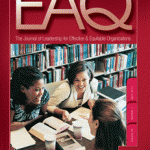For the next five years, the Neag School will provide the editorial team and serve as host institution for the Educational Administration Quarterly (EAQ) journal—an honor that recognizes UConn’s strengths as a leader in education.
“This is a great recognition,” said Educational Leadership Department Head and Professor Casey Cobb, who assumed the role of EAQ editor in November 2013. “Serving as the editorial team of EAQ will only enhance our reputation as one of the top schools of education in the country.”
Founded by the University Council for Educational Administration (UCEA) in 1965, EAQ is one of the most prominent journals in the field of education. Its focus is to promote the publication of rigorous and relevant scholarly articles that advance educational policy, practice and research.
To become host institution, the Neag School went through a competitive application process that began in early 2013 and included UCEA reviewing each candidate institution’s vision for the journal. Institution resources, support and editorial team quality were also considered.
Having edited five issues since taking the EAQ helm, Cobb said it has been “a true team effort.” Editorial team members include associate editors Preston Green (John and Carla Klein Professor of Urban Education), Richard Schwab (Emeritus Dean and Professor of Educational Leadership), Kimberly LeChasseur (Assistant Research Professor with the Center for Education Policy Analysis), Morgaen Donaldson (Assistant Professor of Educational Leadership), Shaun Dougherty (Assistant Professor of Educational Policy & Leadership), Rachel Gabriel (Assistant Professor of Literacy Education), Richard Gonzales (Assistant Professor of Educational Leadership), Jennie Weiner (Assistant Professor of Educational Leadership), Megan Welsh (Assistant Professor in the Measurement, Evaluation and Assessment Program), Sarah Woulfin (Assistant Professor of Educational Leadership), Anysia Mayer (Assistant Professor of Educational Leadership) and Melissa Berggren (Graduate Assistant in School Psychology).
The team holds bi-weekly editorial meetings that include discussions about the journal’s vision and direction. “EAQ is a premier school leadership journal in the field, and we want to ensure we are honoring that domain,” said Cobb. “We hold authors to high standards through our review system, and we hope the articles and research produced have a real impact on the field of K-12 education and leadership preparation for principals, superintendents and teachers.”
“Historically EAQ has been an advocate for social justice,” Cobb continued, “and we are continuing in that tradition in emphasizing educational equity.”
Cobb’s personal research interests include educational policies on school choice, accountability and education reform. He has published in Educational Evaluation and Policy Analysis, Educational Policy, Education and Urban Society, Educational Leadership, and the Peabody Journal of Education.
The newly released February 2014 issue features 11 articles, including:
- From a Managerial Imperative to a Learning Imperative: Experiences of Urban, Public School Principals by Aimee LaPointe Terosky
- Educator Beliefs and Cultural Knowledge: Implications for School Improvement Efforts by Sarah W. Nelson and Patricia L. Guerra
- Collective Student Trust: A Social Resource for Urban Elementary Students by Curt M. Adams
- Mapping the Terrain: Educational Leadership Field Experiences in K-12 Virtual Schools by Jason A. LaFrance.
The journal is published by SAGE, a leading publisher in academics and education.
“It’s a tremendous experience for our earlier career faculty members and graduate students that serve on the editorial team,” Cobb said. “They are getting a lot from the behind-the-scene picture of the scholarly review process, which in a sense also helps them in their own writing.”
Cobb said he feels a great sense of responsibility as EAQ editor: “It has enlightened me in my own work, and it’s a good challenge for me professionally to work in this capacity. I feel the responsibility to carry the mantle for this prestigious journal, as we all know the importance of gatekeepers that we are as scholars.”



